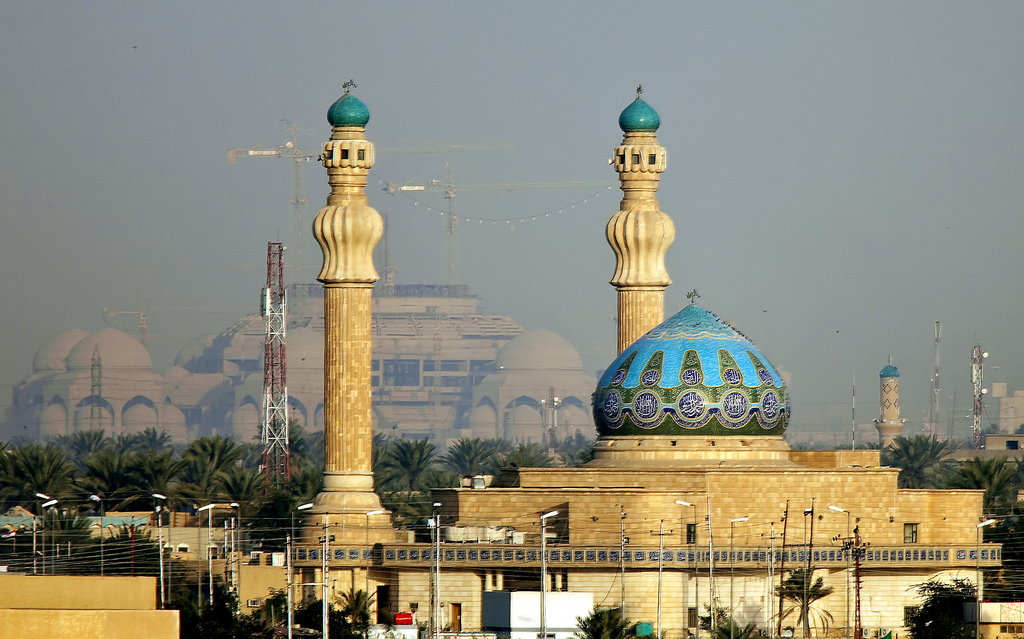U.S., Iran interests overlap on fight against ISIS

By Sara Rajabova
An Arabic proverb says the "enemy of my enemy is my friend". A common enemy can turn two enemies into "friends". This means that the two sides can or should work together against the common enemy.
The theory works well in the case of two longtime enemies - the United States and Iran - making possible their cooperation against a greater threat - the Islamic State of Iraq and Syria (ISIS).
Since June 10, Iraq has been witnessing a fresh wave of violence fueled by the ISIS terrorists. The militants have overrun most of one province and parts of three others north of the Iraqi capital, Baghdad.
The U.S. and Iran have different views on the most important issues of the international relation but it seems their stance on recent developments in Iraq is very close to each other.
The disorder in Iraq damages the U.S. interests in the region but Washington is not willing to start a second war in Iraq. So it is seeking the help of the regional countries. Now, cooperation with Shi'ite Iran, alongside with other Sunni neighbors of Iraq may seem to be helpful, as Tehran also sees ISIS as a threat.
However, currently Washington and Tehran, which have tense relation over the last 30 years, prefer to move separately in Iraq.
Though, the U.S. is against military action against ISIS, it announced the deployment of up to 300 U.S. military advisers to Baghdad.
Besides, the earlier movement of an aircraft carrier, a cruiser and a destroyer into the Persian Gulf shows that Washington doesn't rule out direct intervention to Iraq.
However, U.S. President Barack Obama has been reluctant to engage in the sectarian conflict. Also, the Congress awaits formal request from Iraq for more direct support.
On the other hand, the military intervention in Iraq would not satisfy Iraq's eastern neighbor Iran, as the officials of this country have repeatedly stated that Tehran is against such a move.
Iran's Supreme Leader Ayatollah Ali Khamenei said Iran is strongly opposed to the U.S. and other countries' intervention in Iraq, Iranian media reported.
Also, Iran's Army Ground Forces were put on alertin western and south-western borders of the country, following the recent developments in Iraq.
Besides, Iranian Deputy Foreign Minister for Arab and African Affairs Hossein Amir-Abdollahian said in his last interview to the Iranian media that Tehran will dispatch munitions and military hardware to Iraq to help it battle the ISIS, should Baghdad submit a request.
Earlier, Iraq's Foreign Minister Hoshyar Zebari said the Iraqi government may request Iran's assistance to fight ISIS terrorists.
Though, the options on direct involvement in Iraq are on the table, the countries are not willing to go ahead with a military action to solve the problem. They prefer the diplomacy and efforts by the Iraqi government to put the situation in order.
The American and Iranian diplomats discussed last week the situation in Iraq on the sidelines of the nuclear talks in Vienna on Iran's nuclear program.
Though the U.S. is expected to work with Iran, the State Department stressed there will be no military cooperation.
"Any conversation with the Iranian regime will not include military coordination," White House spokesman Josh Earnest said earlier.
Besides, the U.S.-Iran cooperation comes with a condition. Both sides consider possible the cooperation in the case of resolution of nuclear dispute.
Iranian President Hassan Rouhani has said Iran could work with the U.S. if nuclear negotiations are successful.
The Wall Street Journal quoted a senior U.S. official as saying recently that Washington sees removing international concerns about Iran's nuclear program as a top priority and "until that is addressed and resolved, there cannot be a fundamental change in the relationship" with Iran.
Iran and the world powers are seeking to come to an agreement over Iran's decade-old nuclear dispute until July 20, the deadline for reaching final agreement.
Also, the recent developments in Iraq and other issues of the international relations necessitate the resolution of the nuclear dispute with Iran and restoration of communication between Tehran and Washington.
"It's not that they'd trust U.S. military cooperation - after all, they're still on opposite sides on most other issues in the region (Lebanon, Israel, Syria and Egypt). But they're happy to open lines of communication and even share some useful information tactically if that keeps them on track on the comprehensive nuclear deal," Ian Bremmer, the president of Eurasia Group, told Business Insider.
Fighting against the most dangerous force together could make the sides stronger to solve their problems and melt the deep grudge. This could bring another light on the Middle East and change potentially the political map of the region.
Here we are to serve you with news right now. It does not cost much, but worth your attention.
Choose to support open, independent, quality journalism and subscribe on a monthly basis.
By subscribing to our online newspaper, you can have full digital access to all news, analysis, and much more.
You can also follow AzerNEWS on Twitter @AzerNewsAz or Facebook @AzerNewsNewspaper
Thank you!
